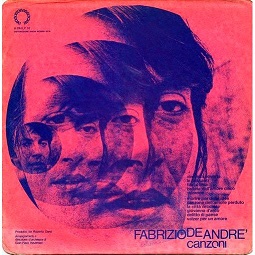by Dennis Criteser on January 9, 2015
Ready for a confession from a music lover and an Italian? I know very little about Fabrizio De Andrè, one of the most legendary Italian singer/songwriters ! However, if you’re not Italian, you’re excused, and luckily today’s guest post will help fill in that gap. I’m a firm believer that music and languages go hand in hand, “vanno a braccetto”! Buona lettura, Mirella
 When my family decided to go to Italy in 2008, my daughter was several years into a deep enthrallment with Shakespeare’s Romeo and Juliet, and especially with the 1968 Franco Zeffirelli film version. Indeed, our trip to Italy was a pellegrinaggio – a pilgrimage. We arrived in Venice and headed for a weeklong stay in Verona. For many travelers to Italy, La Casa Giulietta and La Tomba di Giulietta may be somewhat cheesy tourist destinations, but for my daughter they were churches, power spots suffused with magic and deserving of multiple extended visits so she could be surrounded and entranced by the charge from that story of so long ago.
When my family decided to go to Italy in 2008, my daughter was several years into a deep enthrallment with Shakespeare’s Romeo and Juliet, and especially with the 1968 Franco Zeffirelli film version. Indeed, our trip to Italy was a pellegrinaggio – a pilgrimage. We arrived in Venice and headed for a weeklong stay in Verona. For many travelers to Italy, La Casa Giulietta and La Tomba di Giulietta may be somewhat cheesy tourist destinations, but for my daughter they were churches, power spots suffused with magic and deserving of multiple extended visits so she could be surrounded and entranced by the charge from that story of so long ago.
In preparation for our voyage, my daughter and I spent six months building basic Italian skills with Rosetta Stone. We were able to say simple things, and could sometimes even understand the replies! Following our glorious trip (which also included visits to Mantua, whereto Romeo had been banishéd, and to Toscania where Zeffirelli had filmed the wedding and death scenes), it was time for my daughter to choose a language for study in school. It could be nothing other than Italian. But her school didn’t offer Italian, so we arranged for independent study, and I tagged along for the ride.
Enter Mirella Colalillo. We found Mirella online, then teaching out of Toronto, and proceeded with weekly Skype lessons for two years.
I spent many of my younger years in serious pursuit of music and ended up as program director for a music school in San Francisco. With fatherhood, though, most of my music playing had been set aside. Given my background, Mirella of course sent me some links of Italian musicians to check out. I clicked on the first link and was taken to a song called “L’unica cosa” by Marta sui Tubi. On first listen I thought it was not quite to my tastes, though it had a fun sense of humor. I was going to return to her email and click on the next link when something drew me back for a second listen. Like a revelation, that two minutes and thirty seconds made me feel excited about music in a way I hadn’t felt for decades. I immediately began exploring their other music on YouTube and became, without a doubt, their biggest fan outside of Italy, and for all I know their biggest fan in the world!
Marta sui Tubi single-handedly rekindled my engagement with music. As I continued to study Italian alongside my daughter, I began to explore the world of Italian cantautori. One of the artists I listened to was Fabrizio De Andrè, who is sometimes called the Bob Dylan of Italy. He didn’t immediately grab me as did other great songwriters like Lucio Dalla and Giorgio Gaber, but as I listened more, and in particular as I paid attention to his lyrics, I became ever more impressed with the body of work he created over almost forty years of writing.
With my reawakening to music, I picked up my guitar again, inspired to learn some of the new songs I was listening to, just as I’d done in my younger years. My skills as a singer and guitarist lined up best with the songs of De Andrè, so I was drawn deeper into his musical world. And because Fabrizio De Andrè wrote not only about love but also about politics, social affairs, history and literature, I also learned about many aspects of Italian culture.
I now have a trio that occasionally performs De Andrè songs at the Museo Italo-Americano in San Francisco. And I was inspired to translate all of De Andrè’s songs into English in a way that would do them justice. I’ve just published these translations online – along with background information on each song and album – at deandretranslated.blogspot.com. It’s my hope that the site will be a resource for one of the world’s great singer/songwriters to become appreciated more fully outside of Italy.
Grazie mille, Mirella – my musical rinascimento began with you!
 Dennis Criteser is Program Director of Blue Bear School of Music in San Francisco and has been studying Italian since 2008. An erstwhile singer/songwriter with eight albums to his credit, he is now happily exploring Italian pop music and has just completed translating the songs of Fabrizio De Andrè.
Dennis Criteser is Program Director of Blue Bear School of Music in San Francisco and has been studying Italian since 2008. An erstwhile singer/songwriter with eight albums to his credit, he is now happily exploring Italian pop music and has just completed translating the songs of Fabrizio De Andrè.
Do you have any favourite De Andrè songs? If you do, don’t forget to share them in the comments below! And if you don’t check out Dennis’s blog!

Grazie mille per quest’articolo interessante!
Prego, Evelyn 🙂